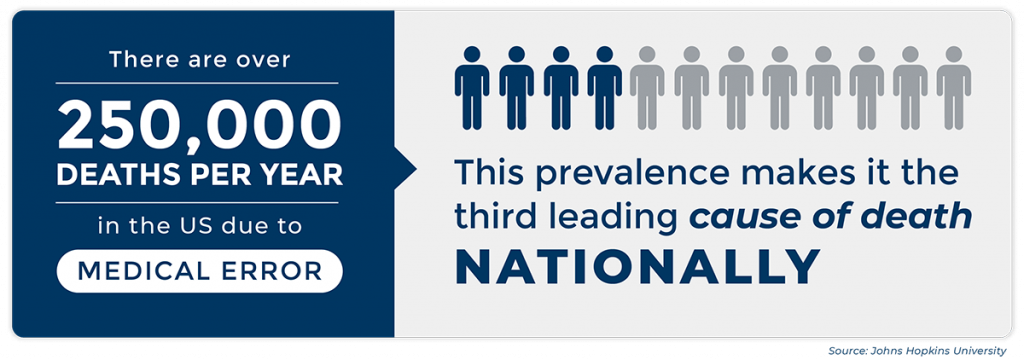There are over 250 000 deaths a year due to medical error

There are over 250,000 deaths a year due to medical error.
Medical errors are an unfortunate reality that contribute to a staggering number of deaths each year. Shockingly, more than 250,000 lives are lost annually due to mistakes made within the healthcare system. This sobering fact raises concerns about the safety and quality of medical care provided to patients worldwide.
When we envision a hospital, the first thought that comes to mind is usually one of healing and recovery. However, the health industry, like any other sector, is not immune to errors. From misdiagnoses and surgical complications to medication mix-ups and communication breakdowns, there are various reasons why medical errors occur. These mistakes can have devastating consequences for patients and their families, leaving a lasting impact on their lives.

The consequences of medical errors are not only emotional but also financial. Families often face hefty medical bills, lost wages, and substantial legal expenses in the pursuit of justice for their loved ones. Moreover, these errors can erode trust and confidence in the healthcare system, leaving individuals wary of seeking necessary medical care.
To address this widespread issue, it is crucial to improve patient safety at every level of healthcare. Comprehensive measures should be implemented, including better communication among healthcare professionals, enhanced training and education, and the adoption of technological advancements to reduce human errors. Furthermore, establishing a culture of transparency, accountability, and continuous learning within healthcare institutions is vital.
The power of knowledge and awareness cannot be underestimated in combating medical errors. By understanding the prevalence and consequences of these mistakes, individuals can become more proactive in managing their own healthcare. Asking questions, seeking a second opinion, and being actively involved in treatment decisions can significantly reduce the likelihood of falling victim to medical errors.
It is essential for healthcare providers and policymakers to prioritize patient safety as a fundamental principle. Robust systems to track and analyze errors, implement preventive measures, and establish stringent protocols can significantly reduce the number of lives lost each year. Collaboration among medical professionals, researchers, and policymakers is necessary to drive meaningful change and eliminate preventable medical errors.
In conclusion, the fact that over 250,000 deaths occur each year due to medical errors is a harsh reality that cannot be ignored. It serves as a reminder of the need for continuous improvement, increased vigilance, and comprehensive strategies to ensure patient safety. By shining a light on this issue and working together, we can strive towards a healthcare system that prioritizes safety, minimizes errors, and saves lives.
Source: Buzzfeed
Tags
Share
Related Posts
Quick Links
Legal Stuff


